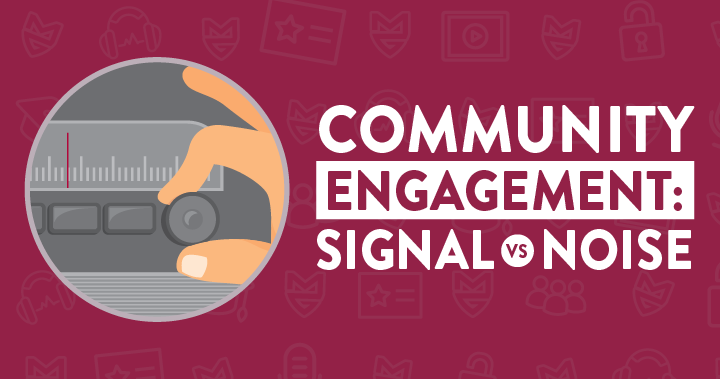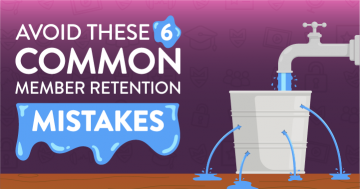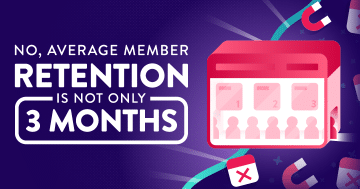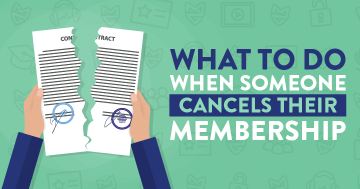Community is an integral part of online memberships.
However deciding where to host that community is a debate in itself.
As is usually the case, there isn’t a definite answer.
Choosing how you host your community depends on several factors, but if you are trying to make this decision, it’s important to know the factors that are worth considering and measuring, and the ones you can ignore or discount.
Enter… the Signal vs Noise ratio.
The two most common options for hosting communities
When membership site owners are trying to choose the platform to use for their membership community, the debate often boils down to “Should I use a Forum or Facebook Group for my community?” and is decided based on engagement and activity levels.
The argument goes something like:
People lean towards Facebook groups because most people have a Facebook account already and, therefore, are more likely to participate on that platform than a private forum.
And, honestly? That is often true.
Facebook groups, very broadly speaking, tend to have more activity than forums…
But activity and engagement are not the same thing.
This is what trips people up – they think that more activity (posts, comments, replies, etc.) equate to higher and better engagement.
More often than not, that is not the case.
Quality is more important than quantity when it comes to community engagement.
Understanding Signal vs. Noise
This is why you need to consider the Signal vs. Noise ratio.
This is about determining how much of the activity in your community is actually useful vs. how much of it is repeated questions, shallow insight, and light conversation.
The qualitative data – the content and discussions that contribute towards members making progress and achieving what they’re there for – is more important than the quantitative data.
But (there’s always a ‘but’, isn’t there?) that isn’t to say lots of low-quality discussion necessarily a bad thing.
It all depends on how important community is to your membership and the role it plays.
Know the purpose of your community
Not every membership site owner truly thinks about the purpose of their community.
They’re aware that community is important and want somewhere for their members to connect, but haven’t thought any deeper about the role their community plays to their members and their overall strategy.
If you’re on the fence about having a community function in your membership, I’d recommend listening to our podcast episode that explores the question: “Do You REALLY Need to Add a Community to Your Membership?”
Right now, though, just ask yourself:
Is your community somewhere for serious, meaningful discussion and in-depth practical support or is it somewhere for people to hang out and chat casually?
There is absolutely nothing wrong with the latter – in fact, it means you don’t need to worry about the Signal vs. Noise ratio so much.

It's fine if your community is more of a pub than a study hall
The balance of quality and quantity isn’t as important if your community is more of a social space.
If you want your community to be a place of learning, development, and meaningful interaction, then you want to be cognizant of what happens in your community, not how much is happening.
Choosing the right option – or options
Facebook groups lend themselves better to being that social space.
Typically they get higher activity, but it’s lower quality.
If you want more quality over quantity, then an on-site forum will be a better fit.
We’ve written before about How to Add an Online Forum to your Membership Website, so do check that out if you want to know more about adding a forum to your membership site.
It doesn’t have to be either/or, though. You can do both.
By getting clear on the purpose your community plays in your membership and understanding how the setting of that community affects the Signal vs. Noise ratio, you could well decide that both have their place.
You could have an onsite forum as the main community hub for meaningful discussions whilst also running a member-only Facebook group that acts as the social space for your members when they’re not in learning mode.
Our experience with forums and Facebook groups
We’re experimenting with a combination of a forum and Facebook group in Membership Academy right now.
That may shock you, if you know my viewpoint on using Facebook for memberships. But we believe it’s always worth challenging our biases, which is why we’re running a three-month trial of an Academy members’ social club.
Our forum in the Academy is where you get detailed support and discussion, but the social club is the place to go for lighter conversation and less intensive discussion.
Interestingly, most of our members have told us they aren’t especially interested in joining our Facebook group and prefer the forum… but some members who have never really used the forum are showing up in the group.
For us, we’ve clearly defined the role of the forum and the Facebook group and how the two connect.
As a result, we’re not experiencing any problems with crossed wires or misplaced content.
A quick note: This is not our free Membership Mastermind from The Membership Guys group, but a group specifically for our paying Membership Academy members. Our Membership Mastermind group is as good and strong as ever!
It’s your membership, it’s your community, it’s your choice
Whichever option you choose, just remember that activity does not equal engagement.
The Signal vs. Noise ratio really matters.
You need to be mindful of the purpose of your community and whether its setting (Facebook group or forum) actually serves the purpose you want it to fulfil.
So many people are on the fence over whether to go with a forum or Facebook group, but the discussion often degenerates into discussions that focus on quantity as the sole metric for measuring the success of a community.
If you just want a casual community, there’s nothing wrong with that and quantity is a good thing.
But if you’re aiming for a community that acts as another layer of value and support for your members queries and problems, you need to look beyond the simple quantitative data.
The type of role that your community plays is entirely up to you and it’s going to be dependent on what you know will work best for your audience.
If it serves your members’ needs, you’re on the right path.





